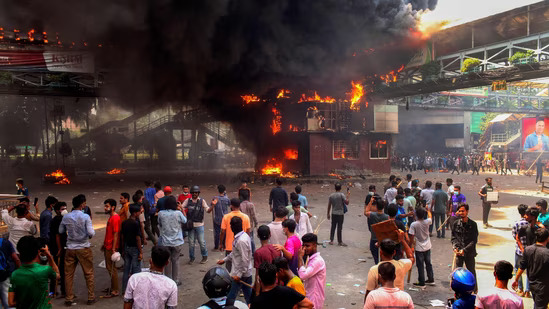Shruti Sneha, Pune
Bangladesh’s Supreme Court lowered a controversial job quota system in response to widespread protests. Over a hundred people have reportedly died as a result of protests over the past week, according to reports in the local media. A system that allocated thirty percent of government jobs to the descendants of veterans who participated in Bangladesh’s 1971 independence war has been called into question by students.
The quota system, according to critics, benefits supporters of the ruling party, Awami League, which sparked East Pakistan’s independence movement.
The quota for descendants of veterans has now been lowered to 5% by an order from the Supreme Court. Merit-based hiring will fill the vast majority of government positions, or 93% of them. The disabled, transgender individuals, and members of ethnic minorities will receive the remaining 2 percent.
Sunday’s decision followed weeks of protests led by students. When demonstrators were attacked by groups connected to the Awami League, protests turned deadly. Police are allegedly using “unlawful force” against protestors, according to campaigners.
Although student organisations applaud the Supreme Court’s ruling, they plan to keep protesting until all of their demands are satisfied. Among these demands are the resignation of the officials in charge of the violence and the release of all prisoners detained during the protests.
Prime Minister Sheikh Hasina’s administration mobilised the army, enforced a curfew, and issued orders to shoot at sight in response to the unrest. These actions were taken in an attempt to put an end to the biggest demonstrations since Hasina was re-elected to a fourth term earlier this year.
Universities in Bangladesh have been shut down since the protests started, and there has been a communications blockade. As police dispersed stone-throwing protestors with tear gas, rubber bullets and smoke grenades, the violence intensified.
The curfew will be lifted for two hours, according to Home Minister Asaduzzaman Khan, to allow people to restock on supplies. But the curfew would be in effect for all time.
The quota system was previously abolished by Hasina’s administration in 2018. But last month, the High Court brought it back, sparking fresh demonstrations and a crackdown by the government. According to Attorney General AM Amin Uddin, the Supreme Court ruled that the High Court’s judgement was “illegal.” In spite of this, Hasina defended the quota system, stating that all veterans—regardless of their political affiliation—should be highly honoured for the services they rendered during the conflict.
The attempts by ministers and government representatives to brand the protesters as “anti-national” have infuriated the demonstrators even more. Tanvir Chowdhury of Al Jazeera reported from Dhaka that there was an “information blackout” by turning off phone and internet access. Protesters’ resentment of the government has been heightened by this brutal crackdown, leading them to call for both the resignation of the government and quota reform.
